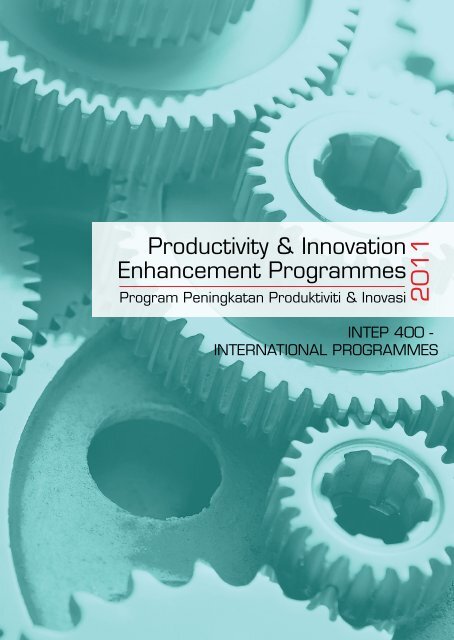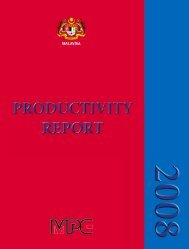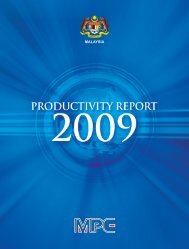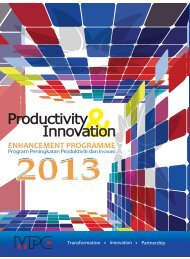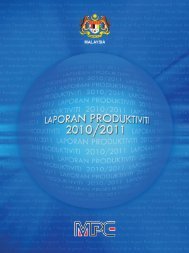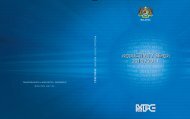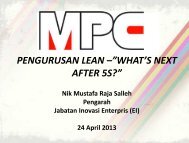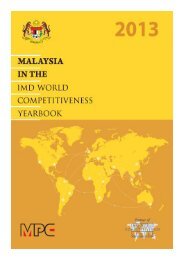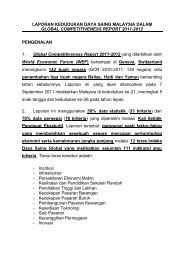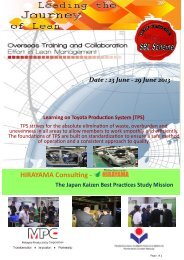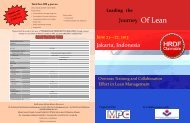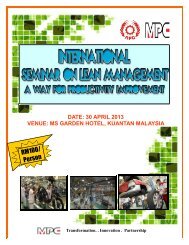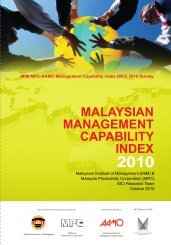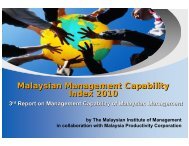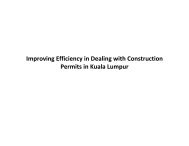Productivity & Innovation Enhancement Programmes - MPC
Productivity & Innovation Enhancement Programmes - MPC
Productivity & Innovation Enhancement Programmes - MPC
Create successful ePaper yourself
Turn your PDF publications into a flip-book with our unique Google optimized e-Paper software.
<strong>Productivity</strong> & <strong>Innovation</strong><br />
<strong>Enhancement</strong> <strong>Programmes</strong><br />
Program Peningkatan Produktiviti & Inovasi<br />
INTEP 400 -<br />
INTERNATIONAL PROGRAMMES<br />
<strong>Productivity</strong> & <strong>Innovation</strong> <strong>Enhancement</strong> <strong>Programmes</strong><br />
Program Peningkatan Produktiviti & Inovasi<br />
2011<br />
103
W.H Furniture &<br />
Works Sdn. Bhd.<br />
Winner of <strong>Productivity</strong> Award 2009<br />
(Manufacturing Category 1)<br />
“To be creative you have to contribute something different<br />
from what you’ve done before. Your results need not be<br />
original to the world; few results truly meet that criterion.<br />
In fact, most results are built on the work of others.”<br />
- Lynne C.Levesque<br />
Breakthrough Creativity<br />
104<br />
2011<br />
<strong>Productivity</strong> & <strong>Innovation</strong> <strong>Enhancement</strong> <strong>Programmes</strong><br />
Program Peningkatan Produktiviti & Inovasi
LIST OF INTERNATIONAL PROGRAMMES (INTEP)<br />
INTEP INTERNATIONAL PROGRAMMES Date Month Venue Fee (RM)<br />
401 International Convention On Quality Control Circle 11 - 14 Sept Yokohama, To be<br />
(ICQCC) 2011 Japan Confirmed<br />
402 <strong>Enhancement</strong> Knowledge and Capacity Building 04 Oct - Oct Petaling Jaya 3000<br />
of Human Resources for OIC Country<br />
12 Nov<br />
403 Training of Trainers on Green <strong>Productivity</strong> 28 Mac - Mar Kuala Lumpur -<br />
22 Apr<br />
404 Workshop on Development of an Asian 20 - 24 June Subang Jaya -<br />
SME Benchmarking Index<br />
405 Training Course on Risk Analysis and Risk 18 - 23 July Subang Jaya -<br />
Assessment for Food Industry<br />
406 International Conference on Green Technology 7 - 11 Sept Petaling Jaya -<br />
407 Training Course on Development of <strong>Productivity</strong> 3 - 21 Oct Subang Jaya -<br />
Practitioners : Advanced Program (DPP : Advanced)<br />
408 E-Learning Course on International Trade of To be To be Bangi -<br />
Agriculture and Food Products Confirmed Confirmed<br />
409 E-Learning Course on Integrated Management Systems To be To be Bangi -<br />
(ISO9001, ISO14001, and OHSAS18001) Confirmed Confirmed<br />
410 E-Learning Course on ISO26000: Guidance on To be To be Bangi -<br />
Social Responsibility Confirmed Confirmed<br />
411 E-Learning Course on Knowledge Management To be To be Bangi -<br />
for the Service Sector Confirmed Confirmed<br />
<strong>Productivity</strong> & <strong>Innovation</strong> <strong>Enhancement</strong> <strong>Programmes</strong><br />
Program Peningkatan Produktiviti & Inovasi<br />
2011<br />
105
INTEP 401<br />
INTERNATIONAL CONVENTION ON QUALITY<br />
CONTROL CIRCLE (ICQCC) 2011<br />
RATIONALE<br />
The proposition of International Convention on Quality Control Circles (ICQCC) was made at the Korean<br />
Control Conference 1975 in Seoul. The Chairman of the Organising Committee of the Conference proposed<br />
that opportunity of exchanging ideas and experience on QC Circle activities should be held periodically among<br />
the countries for further development of the activities. For this reason, the first International Convention on<br />
Quality Control Circles took place in Seoul, 1976.<br />
As the International Convention progressed, the number of participating countries/regions increased. In<br />
addition, there were plenty of demands on changing the organiser every year. Under these circumstances,<br />
all the participating countries/regions in the ICQCC 1986 Seoul reached an agreement that all of them will be<br />
divided into two groups (Group A and Group B) geographically, and each Group would host the Convention<br />
alternately.<br />
Group A<br />
China, Taiwan, Hong Kong, Japan, Korea and the Philippines<br />
Group B<br />
Bangladesh, India, Indonesia, Malaysia, Singapore, Sri Lanka and Thailand<br />
CONTENTS<br />
• Opening Session - Plenary Opening session consists of Opening and Welcoming Address, Keynote<br />
Speech and Special Lecture<br />
• Presentation - Technical Presentation Session is divided into five parallel streams. In streams A and B,<br />
Case Reports implemented by QC Circles in their workplace will be presented. Streams C, D and E will<br />
take the presentation of Reports on the improvement, promotion, education and management of the QC<br />
activities by managers, facilitators and instructors.<br />
• Closing Session and Farewell Dinner - In this plenary session, the closing remarks will be given, followed<br />
by a farewell dinner. Industrial Visit - The participants from abroad are provided with a chance of<br />
Industrial Visit.<br />
WHO SHOULD ATTEND<br />
QC enthusiasts and practitioners or Quality Control Circles (QCC) or Innovative and (CICC) Circles Creative<br />
DURATION<br />
4 days<br />
106<br />
2011<br />
<strong>Productivity</strong> & <strong>Innovation</strong> <strong>Enhancement</strong> <strong>Programmes</strong><br />
Program Peningkatan Produktiviti & Inovasi
INTEP 402<br />
ENHANCEMENT KNOWLEDGE AND CAPACITY BUILDING<br />
OF HUMAN RESOURCE FOR OIC COUNTRIES (MTCP/OIC)<br />
RATIONALE<br />
To enhance organisational capability of the participants by equipping them with multidimensional,<br />
multidisciplinary, and integrated perspectives, strategies and approach for productivity and quality<br />
improvement. This will be carried out through the capacity building of human resources.<br />
OBJECTIVES<br />
At the end of the programme, participants should be able to:-<br />
• Enhance the human resources development of the participating country towards organisational excellence<br />
• Strengthen the participants’ knowledge and understanding in organisational and functional aspects of<br />
human resource.<br />
• Equip participants with analytical and diagnostic skills necessary to identify management problems and<br />
develop their problem solving skills.<br />
• Equip participants with the knowledge of the roles of various tools and techniques available in pursuing<br />
organisational excellence.<br />
CONTENTS<br />
The course is designed with the intention of providing participants with the overall picture of P&Q activities<br />
within the organisation, as well as the exposure and understanding of the best practices employed by<br />
excellent organisations. It also focuses on the development of P&Q activities in their own organisation.<br />
Module 1 : Total quality management, Business organisation and organisational culture<br />
Module 2: Organisational assessment and diagnostic<br />
Module 3 : Developing and understanding in best practices in P&Q<br />
Module 4 : Approaches and tools for productivity improvement<br />
Module 5 : Developing competencies in promoting P&Q movement<br />
Module 6 : Industry training<br />
REQUIREMENTS<br />
Open to Members of Organisational Islamic Countries<br />
• A minimum of 5 years working experiences<br />
• Applicants must be certified medically fit to participate in the programme<br />
• Applicants must have a good command of spoken and written English.<br />
• Applicants should be personnel who are or will be involved in planning and implementation of P&Q<br />
<strong>Enhancement</strong> and Competitiveness in their respective countries.<br />
• Preferably below 45 years of age.<br />
• Holds the qualification of a degree / advanced diploma<br />
• Nominated by their respective Government.<br />
<strong>Productivity</strong> & <strong>Innovation</strong> <strong>Enhancement</strong> <strong>Programmes</strong><br />
Program Peningkatan Produktiviti & Inovasi<br />
2011<br />
107
METHODOLOGY<br />
• Lecture<br />
• Group Work<br />
• Assignment<br />
• Demonstration<br />
• Role Play<br />
• Instrumentation<br />
• Case Study<br />
• Video Presentation<br />
• Games<br />
DURATION<br />
48 days (inclusive of arrival and departure)<br />
JOINTLY ORGANISED BY<br />
<strong>MPC</strong> and Economic Planning Unit (EPU)<br />
108<br />
2011<br />
<strong>Productivity</strong> & <strong>Innovation</strong> <strong>Enhancement</strong> <strong>Programmes</strong><br />
Program Peningkatan Produktiviti & Inovasi
INTEP403<br />
TRAINING OF TRAINERS ON GREEN PRODUCTIVITY<br />
RATIONALE<br />
Green <strong>Productivity</strong> (GP) involves the application of appropriate productivity and environmental management<br />
tools, techniques and technologies to reduce the environmental impacts of an organization’s activities, good<br />
and services while helping to increase profitability. To develop more GP practitioners, the Asian <strong>Productivity</strong><br />
Organization (APO) hold this annual training course. The course modules, methodologies, tools and<br />
techniques will be introduced to the participants to achieve more concrete results. To provide hands-on<br />
experience, participants are exposed to GP diagnosis activities and application of tools and techniques in<br />
actual cases during the in-plant practices.<br />
OBJECTIVES<br />
The objectives of the programme are to develop trainers and practitioners in GP equipped with in-depth<br />
knowledge and hand-on experience in the methodology, tools and techniques which enable them to<br />
disseminate the knowledge as lead trainers / practitioners.<br />
SCOPE AND METHODOLOGY<br />
Scope :<br />
Module 1 : Introduction of the APO and GP<br />
Module 2 : Sustainable development and GP<br />
Module 3 : GP methodology, tools and techniques<br />
Module 4 : GP in practice<br />
Methodology:<br />
Involves lectures by resource speakers / experts, individual presentation, group work, observational study<br />
visits and field practices.<br />
REQUIREMENTS<br />
<strong>Productivity</strong> practitioners from National <strong>Productivity</strong> Organization (NPOs), consultants, firms, and trainers<br />
for SMEs who wish to acquire working knowledge of the GP concept and practices.<br />
DURATION<br />
26 days<br />
JOINTLY ORGANISED BY<br />
<strong>MPC</strong>, INTAN and APO<br />
<strong>Productivity</strong> & <strong>Innovation</strong> <strong>Enhancement</strong> <strong>Programmes</strong><br />
Program Peningkatan Produktiviti & Inovasi<br />
2011<br />
109
INTEP404<br />
WORKSHOP ON DEVELOPMENT OF AN<br />
ASIAN SME BENCHMARKING INDEX<br />
RATIONALE<br />
Benchmarking is a continuous process of searching, learning, adapting and implementing the best practices<br />
from within the same organization or from best organizations elsewhere to sustain growth and compete<br />
globally. The establishment of the Malaysian Benchmarking Index (MBI) is a strategy of the Malaysian<br />
government to allow SMEs to compare their performance with counterparts globally using financial and key<br />
management indicators. To widen the scope to other member countries and to showcase the importance<br />
of benchmarking as a technique for continuous improvement, the APO will organize this workshop in<br />
collaboration with Malaysian <strong>Productivity</strong> Corporation (<strong>MPC</strong>). It is expected that the workshop participants<br />
will draft a plan for establishing an Asian SME Benchmarking Index.<br />
OBJECTIVES<br />
The objectives of the programme are to provide a platform for SMEs in APO member countries for the best<br />
practices sharing and performance measurement against the regional and world best to sustain growth and<br />
compete globally.<br />
SCOPE AND METHODOLOGY<br />
Scope :<br />
• National benchmarking reports<br />
• Malaysian and ASEAN SME benchmarking performance report<br />
• Development of an Asian Benchmarking scoreboard<br />
• Best practice sharing and initiative for improvement in participating countries<br />
Methodology :<br />
Interactive resource paper presentations, group work and observational site visits.<br />
REQUIREMENT<br />
SME owners, National <strong>Productivity</strong> Organization (NPOs) managers / consultants involved in benchmarking<br />
activities or development of SME model companies , or representatives of SME association.<br />
DURATION<br />
5 days<br />
JOINTLY ORGANISED BY<br />
<strong>MPC</strong> and APO<br />
110<br />
2011<br />
<strong>Productivity</strong> & <strong>Innovation</strong> <strong>Enhancement</strong> <strong>Programmes</strong><br />
Program Peningkatan Produktiviti & Inovasi
INTEP405<br />
TRAINING COURSE ON RISK ANALYSIS AND RISK<br />
ASSESSMENT FOR FOOD INDUSTRY<br />
RATIONALE<br />
Risk analysis is a fundamental and comprehensive framework to achieve food safety management. Risk<br />
assessment, which is one of the major components of the risk analysis, is the protocol based on science to<br />
follow in order to assess the status of food safety. Those who have engaged in agricultural production, fishery<br />
and food manufacturing and distribution should study the basic risk analysis and risk assessment procedures<br />
to better understand the structure of food safety regulatory systems and to improve the safety levels of their<br />
products.<br />
OBJECTIVES<br />
The objectives of the programme are to acquaint the participants with key concepts, tools and techniques<br />
used in food safety risk analysis as well as with risk analysis models; enhance understanding of the tasks and<br />
issues associated with risk management, risk communication and risk assessment tools and to organize<br />
follow-up national programs on the subject in the selected Asian <strong>Productivity</strong> Organization (APO) member<br />
country.<br />
SCOPE AND METHODOLOGY<br />
• Basic framework of risk analysis, general and specific protocols of risk assessment.<br />
• Concrete examples of risk assessment<br />
• Typical food-borne illnesses caused by hazardous substances<br />
• Risk communication skills.<br />
REQUIREMENT<br />
Farmers and those responsible for safety and quality in food industries, government officials in charge of<br />
food safety and agrofood industries.<br />
DURATION<br />
6 days<br />
JOINTLY ORGANISED BY<br />
<strong>MPC</strong> and APO<br />
<strong>Productivity</strong> & <strong>Innovation</strong> <strong>Enhancement</strong> <strong>Programmes</strong><br />
Program Peningkatan Produktiviti & Inovasi<br />
2011<br />
111
INTEP406<br />
INTERNATIONAL CONFERENCE ON GREEN<br />
TECHNOLOGY<br />
RATIONALE<br />
The concept of sustainable development based on environmentally friendly products, technologies and<br />
services has become a central issue in many developing and developed countries to mitigate climate<br />
change impacts. It is important for policymakers, industry leaders and community leaders to be aware of<br />
these central issues as many of their decisions normally affect national planning and development. Asian<br />
<strong>Productivity</strong> Organization (APO) has promoted eco-products and green technologies in the Asia-Pacific<br />
through Eco-products International Fairs (EPIFs). The International Greentech & Eco-products Exhibition &<br />
Conference Malaysia (IGEM 2010) which was successfully organised last year grew out of the first EPIF held<br />
in Malaysia in 2004. The APO International Conference on Green Technology will be organised in conjunction<br />
with the IGEM 2011, where the participants will have the opportunity to attend the exhibition and concurrent<br />
conference.<br />
OBJECTIVES<br />
The objectives of the programme aims to promote sustainable development and combat the adverse impacts<br />
of climate change through dissemination and adoption of eco-products and green technologies in member<br />
countries. Specific objectives are :<br />
• Create awareness of the importance of green technology, eco-products, and eco-services for green<br />
growth of the region.<br />
• Provide a forum for dissemination of R&D findings and applications of green technology<br />
• Generate market demand for green technology and eco-products through promotion of green<br />
purchasing and green procurement<br />
• Develop the concept of a regional platform for the promotion of green technology and eco-products.<br />
SCOPE AND METHODOLOGY<br />
Scope :<br />
Scope of this project is organized in conjunction with IGEM 2011. It will discuss how to create an organic<br />
linkage among the existing initiatives to promote eco-products in the region such as the APO, EPIFs, IGEM<br />
2011 and others to boost national and regional competitiveness and create a sustainable society.<br />
Methodology :<br />
Country paper presentations, observations of the exhibition, keynote presentations, expert presentations<br />
and group discussions.<br />
REQUIREMENTS<br />
• Senior representates of past EPIF organizers and senior representatives of organizers of relevant<br />
programmes in the region.<br />
• Managers and consultants who are involved in eco-product development and promotion.<br />
DURATION<br />
4 days<br />
JOINTLY ORGANISED BY<br />
<strong>MPC</strong> and APO<br />
112<br />
2011<br />
<strong>Productivity</strong> & <strong>Innovation</strong> <strong>Enhancement</strong> <strong>Programmes</strong><br />
Program Peningkatan Produktiviti & Inovasi
INTEP407<br />
TRAINING COURSE ON DEVELOPMENT OF PRODUCTIVITY<br />
PRACTITIONERS (ADVANCED PROGRAM)<br />
RATIONALE<br />
The Training Course on Development of <strong>Productivity</strong> Practitioners : Basic and Advanced (DPP : Basic and<br />
Advanced) were launched by the Asian <strong>Productivity</strong> Organization (APO) to develop productivity practitioners<br />
who have skill and knowledge in diagnosing problems and developing and implementing improvement plan.<br />
The overall of the course aims to prepare productivity practitioners to be able to promote productivity.<br />
Diagnose problems, analyze and develop counter measure, consult basic productivity training and providing<br />
consultancy services, develop and implement action plans for the application of productivity techniques in<br />
enterprises and industries.<br />
OBJECTIVES<br />
The objectives of the programme aims to equip participants, who previously attended the basic course with<br />
advanced productivity improvement principles, techniques and approaches. At the end of the advanced<br />
course, productivity practitioners are expected to be able to identify problems and implement solutions for<br />
achieving organizational excellence, identify and use appropriate tools and techniques and provide advice<br />
and consulting services on advanced productivity techniques to the organizations.<br />
SCOPE<br />
The course is based on the major competencies of productivity practitioners as trainers, consultants and<br />
promoters of productivity and quality improvement.<br />
Module 1 : <strong>Productivity</strong> and Business Competitiveness<br />
Module 2 : Corporate Strategies and Implementation<br />
Module 3 : Process Management and Customer Focus<br />
Module 4 : <strong>Productivity</strong> Tools and Techniques<br />
Methodology<br />
• Individual presentation on current job activities related to productivity promotion, training and consultancy<br />
and future plans to specialize in productivity tools and techniques.<br />
• Resource presentations on selected advanced productivity improvement tools and techniques.<br />
• Test before and end of the course to assess the level of competency among participants<br />
• Site visits to companies to observe productivity and quality related activities in place.<br />
REQUIREMENT<br />
Preferably from National <strong>Productivity</strong> Organization (NPOs), consultants with relevant experience in<br />
implementing productivity improvement projects.<br />
DURATION<br />
19 days<br />
JOINTLY ORGANISED BY<br />
<strong>MPC</strong> and APO<br />
<strong>Productivity</strong> & <strong>Innovation</strong> <strong>Enhancement</strong> <strong>Programmes</strong><br />
Program Peningkatan Produktiviti & Inovasi<br />
2011<br />
113
INTEP408<br />
E-LEARNING COURSE ON INTERNATIONAL<br />
TRADE OF AGRICULTURE AND FOOD PRODUCTS<br />
RATIONALE<br />
An understanding of international trade in agriculture and food products is essential for policy makers and<br />
marketing executives of agribusiness and food companies to evolve appropriate policies and or in developing<br />
appropriate marketing strategies. In particular, they have to be familiar with the relationship between agriculture<br />
and the world of international trade, policies affecting trade flows, macroeconomic issues such as exchange<br />
rates and the balance of trade and the impact of international trade on economic development and the<br />
environment. There is also a need for them to be abreast with the issues on trade agreements, technical and<br />
non technical barriers, regulatory policies on exporting and importing of agriculture and food products, as<br />
well as particular requirement of importers related to quality and safety standards.<br />
OBJECTIVES<br />
The objectives of the programme aim to :<br />
• Review the current trends, emerging issues and opportunities in international trade in agriculture and<br />
food products<br />
• Identify measures to address trade issues which restrict the flow of trade in agriculture and food products<br />
• Identify ways in which agribusiness enterprises from member countries can benefit from emerging<br />
opportunities.<br />
SCOPE<br />
• The global trend in trade of agriculture and food products<br />
• Multilateral and bilateral agreements in trade and agricultural products<br />
• Technical and non technical barriers to trade in agriculture products<br />
• Impact of trade in agriculture and food product on the environment<br />
• Role of exports in economic development<br />
• Basic regulation and food safety standards in importing countries<br />
• Formulation of international agriculture trade policies.<br />
Methodology :<br />
Online lectures, online group discussions, online presentations of concepts, methodologies and case<br />
studies.<br />
REQUIREMENTS<br />
Executives and managers from agrofood-processing SMEs, officials of government involved in agriculture<br />
and agribusiness development and export promotion, relevant NPO staff, academias, and representatives of<br />
exporters’ / traders’ associations involved in promoting exports of agriculture and food products.<br />
DURATION<br />
3 days<br />
JOINTLY ORGANISED BY<br />
<strong>MPC</strong> and APO<br />
114<br />
2011<br />
<strong>Productivity</strong> & <strong>Innovation</strong> <strong>Enhancement</strong> <strong>Programmes</strong><br />
Program Peningkatan Produktiviti & Inovasi
INTEP409<br />
E-LEARNING COURSE ON INTEGRATED MANAGEMENT<br />
SYSTEMS (ISO9001, ISO14001 AND OHSAS18001)<br />
RATIONALE<br />
The goal of setting up an integrated management system is to address the quality, health, environmental and<br />
safety requirements of an organization more effectively by combining various existing management systems<br />
(ISO9001, ISO14001 and OHSAS18001) and practices in the organization<br />
OBJECTIVES<br />
The objectives of the programme aim to :<br />
• Enable participants to learn about integrated management system (IMS)<br />
• Understand how an IMS could be developed and implemented in an organization utilizing the Green<br />
<strong>Productivity</strong> (GP) approach.<br />
SCOPE<br />
• Overview of GP concept and methodology<br />
• Quality management systems (ISO9001)<br />
• Environmental management systems (ISO14001)<br />
• Occupational health and safety management systems (OHSAS)<br />
• IMS using the GP approach.<br />
Methodology<br />
Online lectures, online group discussions, online presentations of concepts, methodologies and case<br />
studies.<br />
REQUIREMENT<br />
Environment / quality / safety management personnel, trainers or consultants and technical personnel from<br />
the industry.<br />
DURATION<br />
3 days<br />
JOINTLY ORGANISED BY<br />
<strong>MPC</strong> and APO<br />
<strong>Productivity</strong> & <strong>Innovation</strong> <strong>Enhancement</strong> <strong>Programmes</strong><br />
Program Peningkatan Produktiviti & Inovasi<br />
2011<br />
115
INTEP410 E-LEARNING COURSE ON ISO26000 :<br />
GUIDANCE ON SOCIAL RESPONSIBILITY<br />
RATIONALE<br />
Globalization of business while providing significant benefits to organizations has also resulted in consumer<br />
pressure and media scrutiny of corporate social responsibility (CSR). The ISO has developed the ISO26000<br />
standard covering the overall concepts, definitions and methods of evaluation of CSR. ISO26000 guides<br />
the organisations in the public and private sectors in behaving in a socially responsible way to enhance their<br />
efficiency and competitiveness.<br />
OBJECTIVES<br />
The objectives of the programme aim to :<br />
• Equip participants with the concepts and guidelines for implementing international standards on social<br />
responsibility based on ISO26000.<br />
SCOPE<br />
• Understanding CSR<br />
• Principles of social responsibility<br />
• Guidelines in social responsibility<br />
• Process of developing a roadmap for social responsibility.<br />
Methodology :<br />
Online lectures, online group discussions, online presentations of concepts, and assessment test.<br />
REQUIREMENTS<br />
CEOs from the public and private sector, quality management representatives and managers/executives<br />
responsible for compliance auditing, quality assurance and social responsibility.<br />
DURATION<br />
3 days<br />
JOINTLY ORGANISED BY<br />
<strong>MPC</strong> and APO<br />
116<br />
2011<br />
<strong>Productivity</strong> & <strong>Innovation</strong> <strong>Enhancement</strong> <strong>Programmes</strong><br />
Program Peningkatan Produktiviti & Inovasi
INTEP411<br />
E-LEARNING COURSE ON KNOWLEDGE MANAGEMENT<br />
FOR THE SERVICE SECTOR<br />
RATIONALE<br />
The present scenario in the world economy strongly emphasizes knowledge and information. Therefore,<br />
knowledge transfer, knowledge sharing and the application of knowledge have become increasingly<br />
important. The fast-changing world today requires organizations to be flexible in order to meet new<br />
challenges. Therefore, the building of knowledge–generation capabilities within the organization will help the<br />
organization to face new challenges and be able to sustain and remain relevant in the marketplace.<br />
Knowledge Management (KM) is a critical element in any organization and Asian <strong>Productivity</strong> Organization<br />
(APO) has identified KM as thrust area for productivity improvement in APO member countries. The benefits<br />
of KM go to individuals, teams and organizations as well as society as large. The expected outcome of KM<br />
initiatives are to enhance individual, team and organizational capabilities and to increase social capacity.<br />
OBJECTIVES<br />
The objectives of the programme aim to :<br />
• Provide beginner’s introduction of knowledge management approach tailored for the service sector in<br />
APO member countries.<br />
SCOPE<br />
• APO KM framework<br />
• Basic principles of KM<br />
• KM assessment process and methodologies<br />
Methodology<br />
Online lectures, online group discussions, online presentations of concepts, and assessment test.<br />
REQUIREMENT<br />
Professionals involved in consultancy, NPO staff and KM practitioners in the service sector.<br />
DURATION<br />
3 days<br />
JOINTLY ORGANISED BY<br />
<strong>MPC</strong> and APO<br />
<strong>Productivity</strong> & <strong>Innovation</strong> <strong>Enhancement</strong> <strong>Programmes</strong><br />
Program Peningkatan Produktiviti & Inovasi<br />
2011<br />
117
Tenaga Switchgear<br />
Sdn.Bhd.<br />
Winner of<br />
<strong>Productivity</strong> Award (PA) 2009<br />
(Manufacturing Category 3)<br />
“Discovery consists of seeing what everybody has<br />
seen and thinking what nobody has thought.”<br />
- Albert von Szent-Gyorgy<br />
118<br />
2011<br />
<strong>Productivity</strong> & <strong>Innovation</strong> <strong>Enhancement</strong> <strong>Programmes</strong><br />
Program Peningkatan Produktiviti & Inovasi


